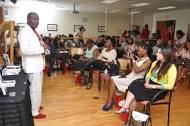
You worked long and hard to write your non-fiction book, and you were driven by passion. Now you have a very expensive business card—your book!—that can open all kinds of doors for you. We’ve talked in the past about how to get good media placements to help you promote your book. Now let’s look at how to use speaking engagements to promote you, your business, and your brand—and sell books in the process.
Passion Displayed and Connections Made with Book Buyers
You believe wholeheartedly in your content and you want to share it with the world. With some non-fiction genres, you perhaps even feel as though your concepts, ideas, and advice can help change the world and make it a better place. That passion, along with a little help from a good speaker’s agent, will help you get high-value speaking engagements. When audiences feel your deep connection and enthusiasm for the topic, it moves and motivates them. The result? Positive testimonials to put on your website, great word-of-mouth referrals, potential new speaking engagements, new clients and business contacts, and last but certainly not least, book sales.
Speaking Engagements for Authors Build a Fan Base
The excitement you have for your subject matter is passed on firsthand to members of your audience, and when that happens, it not only generates book sales but also turns them into brand evangelists for you. If you can create that one-to-one personal connection at book author speaking engagements, it will spark a chain reaction of readers who become deeper fans of your work and can’t wait to tell others all about it.
The fan you connect with will most likely also follow everything you do in the future, connect with you on social media, and establish an ongoing relationship with all your work. The degree of this connection is deeper than you can make with print ads, digital marketing, blog posts, and even radio and TV appearances.
Good Speaking Venues for Non-Fiction Authors
If you’re just starting out and want to try to get speaking gigs on your own, the easiest and lowest-risk place to start is your local bookstore. Talk to the owner and ask if the store will sponsor a reading. After you’ve gotten your feet wet locally, branch out 50 miles in every direction and contact regional bookstores. Not only are bookstores great places to sell books, but by doing several readings in the area, you’ll get local media coverage in papers and events calendars, which creates more buzz for your book. Also, you’ll start to get a feel for what interests people, how to answer their questions, and what you need to work on and polish about your presentation.
Next, look to organizations in your field to find out if they sponsor member meetings and conferences. These could range from PTAs, if you’re a parenting author; to local business groups, if you’re a business author; to support groups, if you’re a health author; to colleges, if you’re a career author, and on and on. Be creative when looking for speaking venues. On a bigger scale, look for industry conferences and associations in your field to find out if they’re looking for speakers. Depending on your expertise and credentials, these are harder to book on your own without the help of a speaker’s agent.
There are also retreat centers and institutes that are centered around seminars, lectures, and workshops. Before going to the top-tier, big-name places, which are also hard to book without the help of a speaker’s bureau, you might want to try doing a local workshop first in a synagogue, church, public library, or other community space that hosts workshops.
Once you can deliver a lively, passionate, informative 15-minute presentation, consider creating a YouTube to post at your website. As you progress in experience and prestige, you can also try applying to national forums such as TEDx.
In the next blog, we’ll look at the key elements to master for a good speaker presentation.
